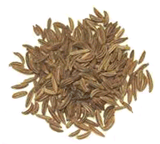
Caraway
Introduction
This fact sheet provides basic information about Caraway. Caraway is a biennial plant in the family Apiaceae, native to Europe and western Asia. The primary active constituent in caraway is volatile oil (4-6 on average), which itself is made up of carvone and limonene. The fruit of the caraway plant contains fixed oil along with carbohydrate and protein. Caraway is a carminative. Carminatives are herbs that help to ameliorate gastrointestinal pain, and associated gas pain. The volatile oil of caraway may also be a useful remedy for bowel spasms.
Common Names
Caraway or Persian cumin
Latin Names
Carum carvi
What It Is Used For
- Appetite loss
- Bronchitis
- Colds
- Cough
- Fever
- Liver and gallbladder problems
- Sore throat
- Tendency to infection
- Colic
- Gingivitis - A mouthwash made from sage oils, peppermint oil, menthol, chamomile tincture, Echinacea, myrrh tincture, clove oil, and caraway seed has been shown effective when used in connection with gingivitis.
- Irritable Bowel Syndrome (IBS) - When combined with peppermint, fennel, caraway, and wormwood, it appears to have a soothing effect on the gastrointestinal system. To date there is not sufficient clinical evidence to support the efficacy of caraway by itself. However, it has been used with a verifiable level of success when used in connection with peppermint oil for irritable bowel syndrome (IBS).
How It Is Used
Caraway is usually administered in the form of a tea you can drink. However, the roots may be cooked as a root vegetable like parsnips or carrots.
What the Science Says
- Under normal dosage and administration, there have been no known side effects or health hazards associated with caraway supplementation.
Side Effects and Cautions
- When large doses of the volatile oil are taken for long periods, potential kidney and liver damage has been noted.
Sources







